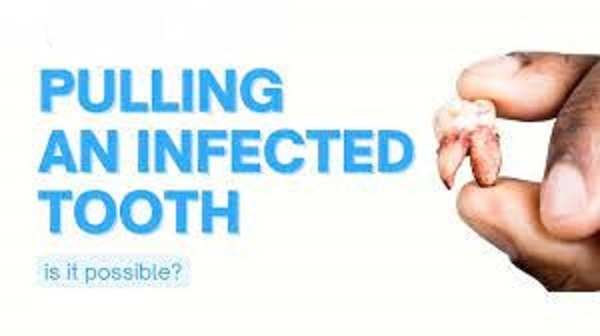Have you also got an infected tooth and are wondering whether you should get it extracted or not? Or do you want to know if it’s possible to get it out or not? Let’s find out.
Yes, you can extract a tooth that is infected, contrary to common belief. In fact, it can be a solution or help in the prevention of spreading the infection. The best way is to consult a doctor and check out the severity of the infection before treating it. Because whether you should extract it or not depends on the area of infection.
Reading this article will teach you all about tooth extraction during an infection. You will learn about the effective treatment you should practice for this condition. Let’s find out its details without further delay.
How Does A Tooth Become Infected?
The process of a tooth becoming infected starts with dental decay. A film of bacteria surrounds the teeth, informing them of the plague. It generates acid that gradually removes the protective enamel. As this advances, it creates openings in the enamel. This camel allows the bacteria to penetrate deeper into the tooth.
Once inside, bacteria can access the pulp chamber. From here, it can affect nerves and blood vessels. As the bacteria add up with the pulp, it causes inflammation and infection. It causes the formation of pus and a dental abscess. Following are some of the symptoms you may feel in this case:
Symptoms Of Infection
You may feel several symptoms due to the infection. Following are some of the common symptoms of infection.
- Severe Toothache
- Sensitivity to Hot and Cold
- Swelling of the Face or Gums
- Pimple-like Bump on Gums
- Fever
- Bad breath or unpleasant taste
- Difficulty or Pain While Chewing
Why Is Tooth Extraction Needed?
Tooth extraction becomes necessary when you leave a dental infection untreated. It is usually done to stop the spread of infection to other critical areas like the jaw, head, or neck. In severe cases, the infection may even extend to the brain. Proper treatment is necessary to prevent such complications.
Delaying tooth extraction by relying only on antibiotics is not the ideal way to treat it. Especially if the infection has reached the nerves. When a tooth is damaged beyond repair, extraction becomes the only solution.
Can A Dentist Pull An Infected Tooth?
Yes, a dentist can indeed pull an infected tooth. The timing of extraction is often important for effective treatment. Extraction, root canal, or deep cleaning could also be done depending on the severity of the infection.
Pulling a tooth is not always the initial option because the primary goal is to eliminate the infection without sacrificing the tooth. Dentists prefer preserving the natural tooth when possible. However, if there is no other option, the doctor may pull a tooth. The dentist will typically numb the area or sedate you for a pain-free procedure.
When Is Tooth Extraction Not Preferred?
There are situations where dentists might advise against extracting the infected tooth. Excessive swelling of the face or stretched oral tissue are some of the common reasons for this advice.
In these cases, dentists treat you by draining the infection first and using antibiotics to control the spread. If you notice any trouble, start regular dental check-ups. These will help in catching signs of infection early. It will protect you from any significant damage.
What Should You Do If You Have A Tooth That Is Infected?
If you suspect you have a tooth infection, it’s crucial to take immediate action. Follow these steps for an effective treatment in this case:
- Schedule a Dental Appointment: Contact your dentist as soon as possible to schedule an appointment. A dental professional will assess the severity of the infection and recommend an appropriate course of action.
- Practice good oral hygiene. While awaiting your dental appointment, maintain diligent oral hygiene practices. Brush your teeth gently twice a day with fluoride toothpaste and floss regularly to remove plaque and bacteria.
- Rinse with Saltwater: Rinse your mouth with warm saltwater multiple times a day. This can help reduce inflammation, alleviate discomfort, and promote a cleaner oral environment.
- Over-the-Counter Pain Relief: Over-the-counter pain relievers, such as ibuprofen or acetaminophen, can help manage pain and reduce inflammation. Follow the recommended dosage and consult with a healthcare professional if you have any concerns.
- Avoid Hot or Cold Foods: Steer clear of extremely hot or cold foods and beverages, as they may exacerbate tooth sensitivity and pain. Stick to a soft diet to minimize irritation.
- Stay Hydrated: Maintain adequate hydration by drinking plenty of water. Proper hydration supports overall health and can contribute to a more comfortable oral environment.
- Do Not Delay Treatment: Dental infections can escalate rapidly, leading to more severe complications. Avoid delaying treatment, as timely intervention is crucial to prevent the infection from spreading to other parts of the body.
Final Words
Extracting an infected tooth is possible. But whether you should extract it or not depends on the severity of the infection. Dental check-ups, good oral hygiene, and timely treatment minimize complications, ensuring the most effective approach to infection management.
Whether opting for extraction or alternative methods, seeking immediate dental attention is crucial to preventing the spread of infection and preserving overall oral well-being. Remember, informed decisions and timely care are the cornerstones of a healthy, infection-free smile.


